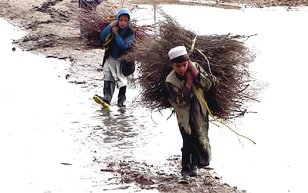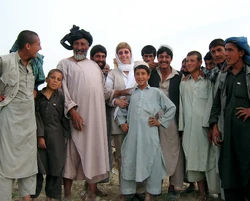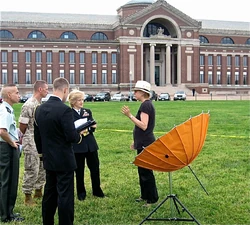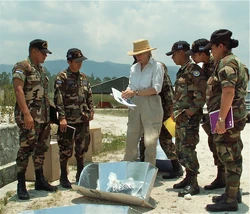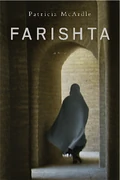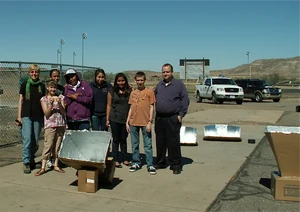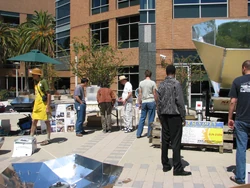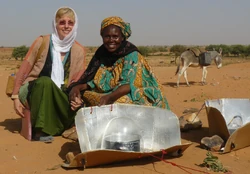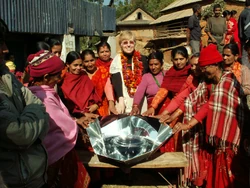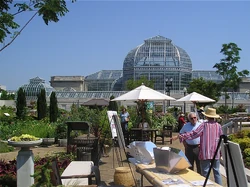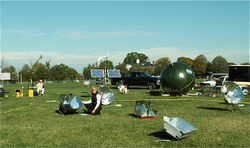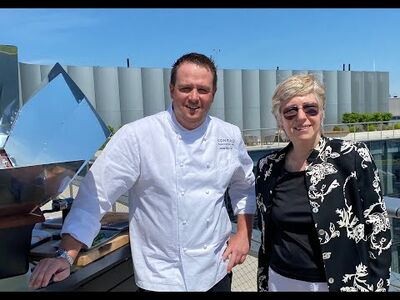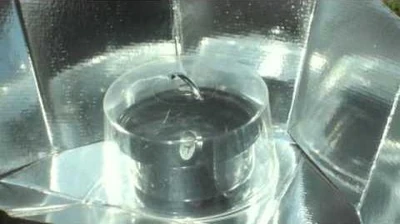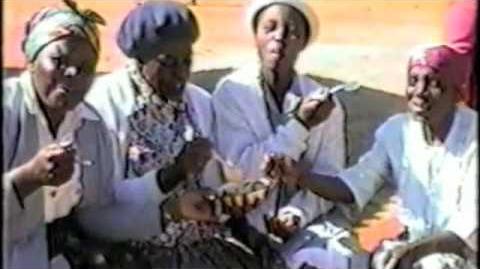Julie Greene (talk | contribs) mNo edit summary |
No edit summary |
||
| (85 intermediate revisions by 8 users not shown) | |||
| Line 1: | Line 1: | ||
{{GoogleTranslateLinks}} |
{{GoogleTranslateLinks}} |
||
| + | {{Updated|3|13|23}} |
||
| + | [[File:Chad Jewish World Watch project - Version 2.jpg|thumb|Patricia McArdle]] |
||
| ⚫ | '''Patricia McArdle''', a member of [[Solar Cookers International]]'s Global Advisory Council, is an advocate of sustainable, renewable energy, and an international promoter of integrated solar thermal cooking technology. Her award-winning novel [http://www.amazon.com/Farishta-Patricia-McArdle/dp/1594487960 Farishta,] inspired by the year she spent in northern [[Afghanistan]] was published by Penguin/Riverhead Books on June 2, 2011. Farishta won the Amazon Breakthrough Novel Award Grand Prize for General Fiction and the San Diego Book Award. |
||
| ⚫ | McArdle served as the editor of the [[Solar Cooker Review]], a board member with [[Solar Cookers International]] and [[Solar Household Energy]]. She continues to promote solar cooking on a volunteer basis by demonstrating, writing and speaking publicly about the benefits of this technology. In her lectures and demonstrations she explains that the widespread use of this simple technology will dramatically improve the lives of the hundreds of millions of women and children who travel miles from their villages to gather wood every week. Using solar cookers in combination with fuel efficient stoves and retained heat cookers (integrated cooking) will also dramatically reduce deforestation and CO2 emissions. Cooking and pasteurizing water with the sun can prevent millions of deaths each year from diseases caused by drinking contaminated water and by inhaling the smoke of cooking fires. McArdle has more than thirty years of international and public affairs experience. |
||
| − | |||
| ⚫ | '''Patricia McArdle''', |
||
| − | |||
| ⚫ | |||
==Background== |
==Background== |
||
| − | + | McArdle served as a Peace Corps volunteer health educator in [[Paraguay]] '72-'74. She joined the U.S. Navy in 1974 and attended Officers Candidate School in Newport, RI. She then spent three years as one of only two female military officers at a remote Naval communications base in Morocco. McArdle is a graduate of the University of New Mexico and has an MBA from Thunderbird School of International Management. After 27 years as a U.S. diplomat, she left government service in 2006. Her last overseas assignment was as the Department of State's senior representative with a British Army Provincial Reconstruction Team in Northern [[Afghanistan]]. It is there that she began her involvement with solar cookers. |
|
'''Here in her own words is the story of her "solar cooker epiphany".''' |
'''Here in her own words is the story of her "solar cooker epiphany".''' |
||
| Line 13: | Line 13: | ||
"I had heard of solar cookers before I went to Afghanistan, but I knew little about them or their incredible potential to save forests, reduce [[household air pollution]] and improve the lives of millions of women. |
"I had heard of solar cookers before I went to Afghanistan, but I knew little about them or their incredible potential to save forests, reduce [[household air pollution]] and improve the lives of millions of women. |
||
| − | [[Image: |
+ | [[Image:Patricia McArdle in Afghanistan 2005.jpg|thumb|right|300px|Patricia McArdle demonstrating her homemade Cookit to the governor, chief of police and villagers of Marmol in Balkh Province, Northern Afghanistan in March 2005]] |
| − | My solar cooker epiphany occurred on a cold but sunny March day while on patrol in the Hindu Kush with |
+ | My solar cooker epiphany occurred on a cold but sunny March day while on patrol in the Hindu Kush with a NATO military observation team. During my travels around northern Afghanistan, I noticed that there were almost no trees and little ground-cover. Locals said the trees had been cut down for firewood or to make charcoal. As we drove one morning up a narrow trail to a remote village in the foothills of the Hindu Kush, we passed a group of young (five to seven year old) children leading donkeys down the trail. |
| − | After our meeting, the soldiers and I were given a tour of the village. |
+ | After our meeting with the local leader, the soldiers and I were given a tour of the village. He showed us the one remaining “forest” in the area, a small grove of cedar and pine growing just above the village. It was guarded night and day to prevent the trees from being cut down for [[Fuelwood|firewood]]. He explained to us that if his village lost their “forest,” the next big rain would wash them away. I was also invited into one of the family compounds and introduced to a women who was cooking lunch over a smoky fire fueled with what looked like tumbleweed stacked in a huge pile next to the mud-walled hut. |
| − | At the end of the day, |
+ | At the end of the day, we drove down the mountain, and again passed the children, who were on their way home. They were struggling to carry enormous bundles of the same brush I had seen the woman cooking with. As we headed west into the glare of the setting sun, I suddenly remembered a solar cooker I had made out of a cardboard box when I was a Girl Scout many years ago. “Someone should tell these people about solar cookers,” I thought. |
| − | [[File: |
+ | [[File:Afghan children carrying brush.jpg|left|308px]]That night, back at our fortified camp in Mazar-e Sharif, I trolled the Internet for information on solar cookers and found the Solar Cooking Archive, managed by [[Solar Cookers International]]. I spent the next few evenings learning about this remarkably simple technology. Eventually I downloaded several plans, and asked the British Army field kitchen staff for some old cardboard boxes, aluminum foil and flour to make paste. With the help of the soldiers, I constructed five different box- and panel-type solar cookers. I took them up to the roof of our compound and, over a period of several weeks, tested them and measured the results. The solar [[CooKit]] won the competition. |
| − | It was clear to me that there was a great potential in |
+ | It was clear to me that there was a great potential in Afghanistan for the widespread distribution of solar cookers to: |
*Reduce the amount of time children spend foraging for fuel |
*Reduce the amount of time children spend foraging for fuel |
||
*Reduce erosion caused by a lack of ground cover (and the resulting flooding) |
*Reduce erosion caused by a lack of ground cover (and the resulting flooding) |
||
| Line 29: | Line 29: | ||
I hoped to return eventually to the village that had inspired me to learn about solar cookers, demonstrate the CooKit, and see how the people would react to this remarkable technology. Several months later, we went back. |
I hoped to return eventually to the village that had inspired me to learn about solar cookers, demonstrate the CooKit, and see how the people would react to this remarkable technology. Several months later, we went back. |
||
| − | It was another cool, sunny day. A small group of men standing in front of the governor’s compound |
+ | It was another cool, sunny day. A small group of men standing in front of the governor’s compound stared in silence as we arrived for our meeting. (Women are not allowed out in public unless the gathering is all female). Before going in to see the governor, I poured a bottle of water into a black pot, put the pot inside a transparent oven (turkey) bag, placed the bag in my homemade CooKit, turned the CooKit to face the sun and went inside with the soldiers. |
| − | [[File: |
+ | [[File:Afghan farmers.jpg|250px|left]] |
When we came out of the meeting 90 minutes later, the pot was steaming and the crowd had swelled from 10 to about 40 men. They were scratching their beards, pointing at the CooKit and trying to figure out how this piece of cardboard covered with shiny paper was able to boil water. Where was the fire? It looked to them like magic even after I explained how it worked. The pot was clearly very hot, but the cardboard and aluminum foil were not. How could this be? They all insisted on coming up to touch the very hot pot and then the cool foil-covered cardboard to confirm what they were seeing. |
When we came out of the meeting 90 minutes later, the pot was steaming and the crowd had swelled from 10 to about 40 men. They were scratching their beards, pointing at the CooKit and trying to figure out how this piece of cardboard covered with shiny paper was able to boil water. Where was the fire? It looked to them like magic even after I explained how it worked. The pot was clearly very hot, but the cardboard and aluminum foil were not. How could this be? They all insisted on coming up to touch the very hot pot and then the cool foil-covered cardboard to confirm what they were seeing. |
||
One of the men exclaimed, “We could make our tea with this!” The others nodded enthusiastically. Another said he would be able to find cardboard, but “where,” he asked, “do I get that [[Reflective material|shiny paper]]?” They all looked at me in silence, waiting for an answer. I wasn’t certain how to reply, because I knew that aluminum foil was not sold anywhere but Kabul, which was more than 100 miles to the south over the Hindu Kush. |
One of the men exclaimed, “We could make our tea with this!” The others nodded enthusiastically. Another said he would be able to find cardboard, but “where,” he asked, “do I get that [[Reflective material|shiny paper]]?” They all looked at me in silence, waiting for an answer. I wasn’t certain how to reply, because I knew that aluminum foil was not sold anywhere but Kabul, which was more than 100 miles to the south over the Hindu Kush. |
||
| − | Another man smiled, reached into his back pocket and took out a pack of cigarettes. He pulled up the inner foil liner and shouted, “We could use this!” The other men nodded, and several more pulled out their own cigarette packs to examine the foil liners. Within five minutes, these men had figured out a use for |
+ | Another man smiled, reached into his back pocket and took out a pack of cigarettes. He pulled up the inner foil liner and shouted, “We could use this!” The other men nodded, and several more pulled out their own cigarette packs to examine the foil liners. A remarkable and almost instantaneous technology transfer had just taken place. Within five minutes, these men had figured out a use for solar cookers and they had discovered a way to manufacture them using a locally available resource. None of them suggested that their wives might be able to cook meals with this technology, but I was still very impressed with their positive and creative reaction to my very brief demonstration. If they only used the CooKit for heating tea water, they would still dramatically reduce biomass consumption in their village. |
| − | I began inquiring about solar cooker projects in Afghanistan and found that |
+ | I began inquiring about solar cooker projects in Afghanistan and found that Kabul residents [[Gordon Magney]] and his wife, who had taught Afghan women to use several thousand [[SPORT]] solar box cookers, were two of the very few people in Afghanistan involved in the promotion of solar cookers. (I learned later that Sun Ovens International had, several years earlier, also distributed solar cookers in Afghanistan.) Magney gave me a detailed proposal for another solar cooker project. I tried to generate support for his project within our embassy and U.S. Agency for International Development (USAID) mission, but, sadly, was not successful. There have been a few other dedicated individuals including [[Grace Magney]] who have promoted solar cooking in Afghanistan. Grace assisted me with a report I prepared in 2008 titled [http://solarcooking.wikia.com/wiki/Promoting_solar_cooking_in_Afghanistan Promoting Solar Cooking in Afghanistan]. I also created a [http://www.youtube.com/watch?v=qk0vEY8sSI0 YouTube video on solar cooking in Afghanistan]. Please see [[Afghanistan]] for additional information on solar cooking projects in that country. Another is Sabur Achtari founder of the '''[[Afghan Bedmoschk Solar Centre|Afghan Bedmoschk Solar Center]].''' |
| − | I have told this story and given solar cooker presentations many times at the U.S. State Department, the Peace Corps, USAID and elsewhere since my return from Afghanistan. In 2007, colleagues from DC-based Solar Household Energy and I set up a demonstration with several types of solar cookers and prepared typical refugee dishes of dried beans and peas in the courtyard of the State Department's Bureau of Population, Refugees and Migration in 2008. PRM's assistant secretary Ellen Saubry ate a plate of our solar cooked food and stated in an [http://asap.ap.org/stories/1810650.s AP video report] that this was an important technology which should be used. |
+ | I have told this story and given solar cooker presentations many times at the U.S. State Department, the Peace Corps, USAID and elsewhere since my return from Afghanistan. In 2007, colleagues from DC-based Solar Household Energy and I set up a demonstration with several types of solar cookers and prepared typical refugee dishes of dried beans and peas in the courtyard of the State Department's Bureau of Population, Refugees and Migration in 2008. PRM's assistant secretary Ellen Saubry ate a plate of our solar cooked food and stated in an [http://asap.ap.org/stories/1810650.s AP video report] that this was an important technology which should be used. We're still waiting for some support from the State Department and USAID. |
| + | |||
| + | The [[Partnership for Clean Indoor Air]], a now closed branch of the U.S. government's Environmental Protection Agency, funded solar cooker projects in Mexico, Bolivia and Kenya. In 2009 I helped coordinate an issue of an EPA [http://images1.wikia.nocookie.net/solarcooking/images/d/dd/PCIA-Bulletin-Issue-22.pdf PCIA on-line bulletin that focused exclusively on solar cooking]. |
||
| + | |||
| ⚫ | For several years, the Defense Department showed some interest in solar cooking, The The [[STAR-TIDES]] group at the National Defense University invited solar cooking reps to participate in their first week long outdoor TIDES expo in 2007. I organized the solar cooking demos during TIDES for the next six years. Until 2016, TIDES demos took place at the National Defense University and the Pentagon. Their annual expo is now held at George Mason University in Virginia. [[File:NDU parabolic SC.jpg||right|250px]] DOD's SouthCom sent me twice to Honduras and once to Guyana to demonstrate solar cooking to military personnel, civil defense officials and university students, as part of annual disaster preparedness simulations. [[File:HOnduran soldiers.jpg|right|250px]] U.S. military officers serving at Provintial Reconstruction Teams in Afghanistan have worked with local Afghan craftsmen to build and promote the use of solar cookers. As a former Naval Officer and the daughter of a career Marine officer, I am grateful for and very supportive of the interest shown by the U.S. military in this technology. I only wish I could convince my civilian government colleagues to show the same degree of enthusiasm for this zero emission, renewable energy technology. Every Peace Corps volunteer going to an energy-starved, sun drenched country should receive training in solar cooker technology. In 2021, I was asked to write the solar cooking section for the [https://pclive.peacecorps.gov/pclive/index.php/pclive-resources/resource-library/115-m0091-peace-corps-imprved-cookstoves-handbook/file Peace Corps Improved Cookstove Handbook]. In I remain hopeful that future administrations will give greater support to the spread of this simple, green, technology that uses earth's most abundant source of energy." ''' --Pat McArdle''' |
||
| ⚫ | |||
{{clr}} |
{{clr}} |
||
| + | =={{HeadingNews}}== |
||
| − | ==News and recent developments== |
||
| + | [[File:Pat McA. at STAR-TIDES 2022, 4-26-22.jpg|thumb|400px|[[Pat McArdle]] presents [[Integrated Cooking Method|solar/integrated cooking]] information at STAR-TIDES 2022. ''Photo credit: [[Pat McArdle]]]] |
||
| + | *{{NewApr22}}'''April 2022:''' [[Pat McArdle]] hosted an exhibit on [[Integrated Cooking Method|solar/integrated cooking]] at the [[STAR-TIDES]] expo on the grounds of George Mason University in northern {{state|Virginia}}, [[USA]] in mid-April. The purpose of this civ/mil entity is to identify low-cost, sustainable solutions for supporting distressed populations damaged by disasters, war, or poverty and to share this knowledge openly with anyone, including military, government, non-government, and civilian agencies. She built a sixteen brick [[rocket stove]] and made a [[Heat-retention cooking|retained heat container]] using a plastic storage bin and some blankets. In spite of the windy weather, solar and other integrated cooking concepts were successfully presented. From 2013 to 2020 the U.S. Army sent Pat three times to Central America to teach solar cooking during military disaster exercises. She used the [[Cookit]] for all of those exercises since it was the lightest and most portable solar cooker at that time. |
||
| + | |||
| + | *{{NewMay21}}'''May 2021: Unique solar cooking techniques''' - Patricia McArdle organized the first Zoom discussion for members of the Solar Cookers world Network. Presenters discussed unique ways to solar cook. Some focused on foods, some on techniques and others on technology. Here's the link to today's discussion: [https://us02web.zoom.us/rec/play/FRJaOMuNeZIAtp5KBem7CsnQixnwLeJE7AMHX3dvUGVJ10W_ocghBnc4MfwyC2s8N4s2Pe7htVvzv6o2.VjCFuDufmDRqhsSR?startTime=1621695932000&fbclid=IwAR3Wc7MRb-t577AtUUfIF1WVYFNqSvCOoH1LSpKJU7oNBt8xcsamP_WKTpA Unique solar cooking techniques] |
||
| + | *{{NewFeb20}}'''February 2020:''' [http://www.sunpod.de/2020/02/260-sunpod-interview-pat-mcardle-solar-cooking-in-afghanistan/ Pat McArdle was interviewed at the third CONSOLFOOD by Michael Bonke on his podcast, SunPod] |
||
| + | **March 21, 2020 [https://www.theicala.org/en/events/234-flip-the-switch-party-cancelled Solar cooking demo at Los Angeles Institute of Contemporary Art cancelled due to pandemic] |
||
| + | **January 20, 2020 [http://www.consolfood.org/wp-content/uploads/2015/12/programme-version-7.pdf Moderator ColSol Food conference panel, Faro, Portuga]l |
||
| + | **January 18, 2019 Interview with [https://peacecorpsworldwide.org/rpcv-patricia-mcardle-pcv-diplomat-novelist-solar-cook-paraguay/ Peace Corps Worldwide] |
||
| + | **May 3, 2017 Lecture at [https://www.valleycenter.com/articles/u-s-diplomat-to-talk-on-solar-cooking-at-dos-valles-may-9-meeting/ Valley Center, California on solar cooking technology] |
||
| + | **April 28, 2017 [https://www.ocregister.com/2017/04/20/middle-schoolers-learn-earth-friendly-lessons-at-cal-state-fullerton/ Solar Cooker Demo at Cal State Fullerton] |
||
| + | **July 17, 2012 [https://www.keranews.org/2012-07-17/cooking-on-the-sunny-side-how-solar-chefs-put-food-on-the-table Interview with Kera 'news for north Texas] |
||
| + | **May 12, 2017 https://www.solarcooker-at-cantinawest.com/why-are-some-organizations-against-solar-cooking-as-a-feasible-means-of-cooking.html |
||
| + | **March 2017 [https://www.youtube.com/watch?v=g4_5HTIYP9o lecture on solar cookers in refugee camps at SCI conference in India] |
||
| + | |||
| + | *{{NewAug16}}'''August 2016:''' [[Patricia McArdle]] has drafted a detailed report covering the history and present state of refugee camp solar cooking programs. [[Media:Refugee camps and solar cookers - Patricia McArdle - July 2016.pdf|Read the report...]] |
||
| + | |||
| + | *June 17, 2016 [https://www.ci.oceanside.ca.us/civicax/filebank/blobdload.aspx?BlobID=41879 Solar cooker demo and lecture at LIFE Mira Costa College, Oceanside, Ca.] |
||
| + | *May 2016 [https://www.afsa.org/what-we-are-doing-now Foreign Service Journal "Pat McArdle-What Retired Diplomats are Doing Now"] |
||
| + | *March 18, 2016 [https://sdwomensweek.com/speakers/patricia-mcardle/ Patricia McArdle speaks about solar cooking at San Diego Women's week.] |
||
| + | *April 21, 2015 [https://gosol.org/Meeting-Patricia-Mc-Ardle-the-Solar-Lady GoSol interview] |
||
| + | *[https://www.alumniconnections.unmalumni.com/s/1730/20/interior-wide.aspx?sid=1730&gid=2&sitebuilder=1&pgid=1702 2017 Interview with UNM alumnus Patricia McArdle] |
||
| + | *'''January 2015:''' [[Media:GACC post-summit-report .pdf|GACC has released their November 2104 Post-Summit Report]] |
||
| + | |||
| + | *'''January 2015:''' [[Media:GACC 2014 meeting summary, Pat McArdle, 1-21-15.pdf|Patricia McArdle's responds to the GACC Post-Summit Report from the November 2014 conference.]] |
||
| + | *[http://washplusblog.fhi360.org/iaqupdates/2014/09/patricia-mcardle-funding-for-solar-cookers-factors-that-give-funders-confidence-video/index.html September 26, 2014 Lecture on the factors that give donors confidence to fund solar cooking] |
||
| + | *August 2014: [http://www.goodearthgreatchefs.com/sunset-great-outdoors Solar cooking demo with Sunset Magazine cooks, which included solar cooker recipes in their book Great Outdoors Cookbook, which included solar cooker recipes.] |
||
| + | *July 2014 [https://thinmint.sdgirlscouts.org/newsletters/Connections/2014/201407.html Speaker at Girl Scout San Diego Award Ceremony] |
||
| + | *June 11, 2014 [https://thecoastnews.com/oceanside-author-get-girl-scout-cool-award/ Patricia McArdle receives Girl Scout 'Cool' Award, Coast News] |
||
| + | *March 24, 2015 [https://supicket.com/wellness-center-hosts-fifth-annual-book-fest-expo/ Shepherd University Book expo] |
||
| + | |||
| + | *'''March 2014:''' [[Pat McArdle]] was interviewed for the feature story in this month's edition of the [[TIDES]] (Transformative Innovation for Development & Emergency Support) newsletter. She describes her role, and that of [[Solar Cookers International]], to introduce solar cooking to, as Pat puts it, "people in sun-rich countries in the developing world who were running out of wood to burn." Solar cooking was unknown in this part of the world at the time. Many of the early projects were started in the late eighties. She also explains how solar cooking is a key component of the practical [[Integrated Cooking Method|integrated cooking]] method. [http://startidesnet.wordpress.com/2014/03/05/interview-with-solar-cookers-internationals-pat-mcardle/?utm_source=February+2014+Newsletter&utm_campaign=Jun+2012&utm_medium=email Read the interview...] |
||
| + | *March 18, 2013 [https://blogs.worldbank.org/energy/mobilizing-a-100-billion-market-to-bring-clean-cooking-solutions-to-the-poor World Bank: Mobilizing a $100 billion market to bring clean cooking to the poor (see comments section)] |
||
| + | *June 8, 2013 [https://www.yumpu.com/en/document/view/50653189/malawi-and-solar-cookers-international-june-8-24-nocookienet Malawi and solar cooking] |
||
[[File:EmeraldPlanet - Paving the Way to 2050 (Future Earth 4) Technologies; Services; & Products|right|300px]] |
[[File:EmeraldPlanet - Paving the Way to 2050 (Future Earth 4) Technologies; Services; & Products|right|300px]] |
||
| − | *'''November 2012: Former SCI board member Pat McArdle is interviewed on Emerald Planet''' - During the interview [[Pat McArdle]] discusses the history and mission of [[Solar Cookers International]], the importance of increasing access to solar cooking technology, Bob Metcalf's [[Portable Microbiology Laboratory]] for testing water in remote locations, the work of [[Jewish World Watch]] in [[Chad]], and more. |
+ | *'''November 2012: Former SCI board member Pat McArdle is interviewed on Emerald Planet''' - During the interview [[Pat McArdle]] discusses the history and mission of [[Solar Cookers International]], the importance of increasing access to solar cooking technology, Bob Metcalf's [[Portable Microbiology Laboratory]] for testing water in remote locations, the work of [[Jewish World Watch]] in [[Chad]], and more.] |
| + | *September 28, 2012 [https://www.ndu.edu/News/Press-Releases/Article/572600/tides-6th-annual-fall-field-demonstration/ Solar cooker exhibit at DOD TIDES expo (6th year of participation)] |
||
| + | *Fall 2012 [https://www.afsa.org/what-we-are-doing-now Patricia McArdle becomes editor of the solar cooker review for it's final seven issues 11/2012-9/2014] |
||
| + | *August 6, 2012 [http://solarray.blogspot.com/2012/08/solar-stove-design-challenge.html A more durable solar cooker] |
||
*'''May 2012:''' [[Pat McArdle]] describes the current '''top ten solar cooking projects''' - [[Media:Ten most significant solar cooking projects-McArdle-2012.pdf|Read the document]]. |
*'''May 2012:''' [[Pat McArdle]] describes the current '''top ten solar cooking projects''' - [[Media:Ten most significant solar cooking projects-McArdle-2012.pdf|Read the document]]. |
||
| + | *June 21, 2012 [http://blogs.washplus.org/iaqupdates/2012/06/a-more-durable-solar-cooker-for-desert-refugee-camps/index.html A more durable solar cooker for refugee camps USAID] |
||
| − | *'''January 2012:''' |
+ | *'''January 2012:''' Workshop on the construction of [[Scheffler Community Kitchen]]s in Dhule, India: [[Media:Solar Cooking Workshop Dhule 2012 .pdf|Read report]]. |
| + | *June 9, 2011 [https://blog.girlscouts.org/2011/06/foriegn-service-officer-patricia.html Girl Scout profile on solar cooker promoter] |
||
| − | *'''October 2011:''' [[Patricia McArdle]], of [[Solar Cookers International]], demonstrated solar cooking with [[Afzal Syed]] and volunteers, Sherry and Cecily, at the [[TIDES]] exhibit on the campus of the National Dense University. Afzal brought several pots of raw ingredients for Pakistani dishes that were prepared by his wife Samina, including: masoor dall, spiced potatoes, okra, and chawal rice. Patricia baked a loaf of banana bread, which was consumed in less than five minutes. They used the parabolic SK10 (similar to the [[SK12]]), purchased from [[Deepak Gadhia]] several years ago, to keep a pot of water boiling from 9 a.m. in the morning until the event ended at 5 p.m. There were a number of senior military visitors from other countries. Several have expressed an interest in learning more about solar cooking technology and how it can be used in their countries. The most surprising visit yesterday was from a Vietnamese general, the most senior Vietnamese military officer to visit the U.S. since before the war with Vietnam started in the sixties. Several 'very important people' who came to the demonstration assumed that it would take us 10 to 12 hours to cook food in a [[Solar panel cookers|panel]] or [[ |
+ | *'''October 2011:''' [[Patricia McArdle]], of [[Solar Cookers International]], demonstrated solar cooking with [[Afzal Syed]] and volunteers, Sherry and Cecily, at the [[TIDES]] exhibit on the campus of the National Dense University. Afzal brought several pots of raw ingredients for Pakistani dishes that were prepared by his wife Samina, including: masoor dall, spiced potatoes, okra, and chawal rice. Patricia baked a loaf of banana bread, which was consumed in less than five minutes. They used the parabolic SK10 (similar to the [[SK12]]), purchased from [[Deepak Gadhia]] several years ago, to keep a pot of water boiling from 9 a.m. in the morning until the event ended at 5 p.m. There were a number of senior military visitors from other countries. Several have expressed an interest in learning more about solar cooking technology and how it can be used in their countries. The most surprising visit yesterday was from a Vietnamese general, the most senior Vietnamese military officer to visit the U.S. since before the war with Vietnam started in the sixties. Several 'very important people' who came to the demonstration assumed that it would take us 10 to 12 hours to cook food in a [[Solar panel cookers|panel]] or [[box cooker]]. They were astounded that the food was cooked in less than three hours--in October-- in {{state|Washington, D.C.}}--which is 40 degrees north of the equator. |
<table><tr><td valign="top"> |
<table><tr><td valign="top"> |
||
| − | [[File: |
+ | [[File:TIDES solar cooking exhibit 10-11, 1.jpg|thumb|275px|Patricia McArdle and volunteer Cecily, remove Pakistani okra from a [[CooKit]] [[Solar panel cookers|panel]] cooker at TIDES 2011.]] |
</td> |
</td> |
||
| − | <td valign="top">[[File: |
+ | <td valign="top">[[File:TIDES solar cooking exhibit 10-11, 2.jpg|thumb|[[Afzal Syed]] opens a pot of Pakistani dall at TIDES 2011|275px]]</td></tr><tr> |
<td> |
<td> |
||
| − | [[File: |
+ | [[File:TIDES solar cooking exhibit 10-11, 3.jpg|thumb|275px|Everything was cooked by one p.m. and gone by 2 p.m. at TIDES 2011]] |
</td> |
</td> |
||
<td> |
<td> |
||
| − | [[File: |
+ | [[File:TIDES solar cooking exhibit 10-11, 4.jpg|thumb|275px|People continue to be amazed--especially that it takes only twenty minutes to boil a pot of water at TIDES 2011.]] |
</td></tr></table> |
</td></tr></table> |
||
| ⚫ | |||
| + | *July 19, 2011 [https://www.news24.com/news24/solar-ovens-offer-hope-in-afghanistan-20110719 Solar ovens offer hope] News 24 interview |
||
| ⚫ | |||
| + | *July 19, 2011 [https://www.arabnews.com/node/384496 Arab News solar ovens] |
||
| ⚫ | *'''July 18, 2011 Solar ovens, renewable energy offer hope for Afghanistan (Reuters)''' - At first, she noticed Afghan children hauling brush. Then, in Afghan family compounds, she noticed women tending small fires and trying to cook over them. But it wasn't until U.S. diplomat [and [[Solar Cookers International]] Board Member] Patricia McArdle realized how often it was sunny in Afghanistan that she put it together with a youthful memory of cooking with solar ovens and realized this was a low-tech option offering long-term hope to the war-torn nation, which is preparing for a draw-down of U.S. troops. At first, she noticed Afghan children hauling brush. Then, in Afghan family compounds, she noticed women tending small fires and trying to cook over them. But it wasn't until U.S. diplomat [and SCI Board Member] Patricia McArdle realized how often it was sunny in Afghanistan that she put it together with a youthful memory of cooking with solar ovens and realized this was a low-tech option offering long-term hope to the war-torn nation, which is preparing for a draw-down of U.S. troops. [http://www.reuters.com/article/2011/07/19/books-afghanistan-energy-idUSL3E7IC0T820110719 Read more...] |
||
| + | *July 8, 2011 [http://www.she-inc.org/docs/131.pdf Solar Cooking Expo at Dar al Nur Mosque in northern Virginia]. [https://patch.com/virginia/dalecity/video-solar-cooking-demonstration view interview at the mosque] |
||
| + | *July 6, 2011 [https://thekojonnamdishow.org/shows/2011-07-06/farishta-american-diplomat-afghanistan Kojo Naamdi show interview with Patricia McArdle] |
||
| ⚫ | |||
| ⚫ | *'''Solar ovens, renewable energy offer hope for Afghanistan (Reuters)''' - At first, she noticed Afghan children hauling brush. Then, in Afghan family compounds, she noticed women tending small fires and trying to cook over them. But it wasn't until U.S. diplomat [and [[Solar Cookers International]] Board Member] |
||
| + | *June 20, 2011 New York Times op-ed [https://www.nytimes.com/2011/06/20/opinion/20mcardle.html "Afghanistan's Last Locavores"] |
||
| − | |||
| ⚫ | *'''June 2011: Voice of America interviews Patricia McArdle about her novel ''Farishta''''' - [[Solar Cookers International]] board-member Patricia McArdle discusses her award-winning novel in which solar cooking in [[Afghanistan]] is featured. Audio available [http://www.voanews.com/english/news/usa/arts/US-Womans-Afghan-Experience-Inspires-Novel-124293344.html here]. |
||
| ⚫ | |||
| + | *May 2011 [https://authorlink.com/interview/patricia-mcardle-discovers-the-meaning-of-angel/ interview with Farishta author] |
||
| ⚫ | *'''June 2011: Voice of America interviews Patricia McArdle about her novel ''Farishta''''' - [[Solar Cookers International]] board-member |
||
*'''January 2011:''' [[Pat McArdle]] joins the Global Alliance for Clean Cookstoves working group on Fuels and Technology, to represent the global solar cooking community. |
*'''January 2011:''' [[Pat McArdle]] joins the Global Alliance for Clean Cookstoves working group on Fuels and Technology, to represent the global solar cooking community. |
||
*'''October 2010:''' The Voice of America interviews McArdle about [[Solar Cookers International]]'s participation for the third year at the annual [http://star-tides.net/ TIDES] disaster relief technology gathering at the National Defense University in Washington D.C. TIDES' goal is to facilitate the sharing of information with quicker response times when natural disasters occur. |
*'''October 2010:''' The Voice of America interviews McArdle about [[Solar Cookers International]]'s participation for the third year at the annual [http://star-tides.net/ TIDES] disaster relief technology gathering at the National Defense University in Washington D.C. TIDES' goal is to facilitate the sharing of information with quicker response times when natural disasters occur. |
||
| + | |||
| − | [[ |
+ | ::[[File:Disaster Relief Technology|thumb|none|400px|[[Pat McArdle]] interviewed about disaster relief technology.]] |
| − | {{clr}} |
||
| + | |||
| − | [[File:Farishta, |
+ | [[File:Farishta, a novel.jpg|right|120px]] |
*'''June 2010:''' McArdle's novel '''''Farishta''''' which has solar cooking in [[Afghanistan]] as a subplot won [http://goo.gl/tMeN Amazon's Breakthrough Novel Award]. It will be published on June 2, 2011. |
*'''June 2010:''' McArdle's novel '''''Farishta''''' which has solar cooking in [[Afghanistan]] as a subplot won [http://goo.gl/tMeN Amazon's Breakthrough Novel Award]. It will be published on June 2, 2011. |
||
{{clr}} |
{{clr}} |
||
| − | [[File: |
+ | [[File:White Horse HS.jpg|300px|right]] |
*'''May 2010:''' Utah-based Adopt-a-Native Elder asked McArdle to join one of their food runs to the Navajo reservation to make a series of presentations on solar cooking. She discovered that in the winter when roads are closed by deep snow and propane runs out, many Navajos cut down trees for firewood. In the summer when it's too hot to cook indoors, it is common to light a wood fire outside for cooking. Sunshine is abundant and despite "no cutting down trees" warnings in the national parks, she saw hillsides that had been stripped of their trees and thousands of acres formerly covered with juniper and pinyon trees that are now barren desert. The Navajos who saw the solar cookers and ate her chili and corn bread were intrigued by these devices. Twenty volunteers took the different models home and agreed to keep a one month log of solar cooker use. A family of sheepherds took several Cookits, which are light enough to strap to their saddles for long trips into the mountains. Adopt-a-Native-Elder has already heard from one satisfied customer, a Navajo rug weaver, who slaughtered a sheep for a family event and roasted a chunk of the meat in his Sun Oven. McArdle met a group of Navajo students at White Horse High School in Montazuma Creek, Utah, who have constructed a fresnel lens solar cooker for making fry bread. They were finalists in the national Spirit of Innovation Award. Their science teacher Paul McCarl is hoping to manufacture more of these cookers that his students can demonstrate at local gatherings during the summer. |
*'''May 2010:''' Utah-based Adopt-a-Native Elder asked McArdle to join one of their food runs to the Navajo reservation to make a series of presentations on solar cooking. She discovered that in the winter when roads are closed by deep snow and propane runs out, many Navajos cut down trees for firewood. In the summer when it's too hot to cook indoors, it is common to light a wood fire outside for cooking. Sunshine is abundant and despite "no cutting down trees" warnings in the national parks, she saw hillsides that had been stripped of their trees and thousands of acres formerly covered with juniper and pinyon trees that are now barren desert. The Navajos who saw the solar cookers and ate her chili and corn bread were intrigued by these devices. Twenty volunteers took the different models home and agreed to keep a one month log of solar cooker use. A family of sheepherds took several Cookits, which are light enough to strap to their saddles for long trips into the mountains. Adopt-a-Native-Elder has already heard from one satisfied customer, a Navajo rug weaver, who slaughtered a sheep for a family event and roasted a chunk of the meat in his Sun Oven. McArdle met a group of Navajo students at White Horse High School in Montazuma Creek, Utah, who have constructed a fresnel lens solar cooker for making fry bread. They were finalists in the national Spirit of Innovation Award. Their science teacher Paul McCarl is hoping to manufacture more of these cookers that his students can demonstrate at local gatherings during the summer. |
||
| + | |||
| − | [[File: |
+ | <br />[[File:Google 031.jpg|right|250px]] |
*'''April 2010:''' For the second year in a row, Google has invited solar cooker promoters to host an Earth Day demo and display at Google headquarters in Mountain View, California. |
*'''April 2010:''' For the second year in a row, Google has invited solar cooker promoters to host an Earth Day demo and display at Google headquarters in Mountain View, California. |
||
| + | *Oct. 7, 2009 [https://www.dvidshub.net/news/39789/mcnair-exhibit-showcases-disaster-relief-solutions DOD expo at War College features solar cookers] |
||
| ⚫ | |||
| + | |||
| ⚫ | |||
*'''October/November 2009:''' McArdle was invited by Tchad Solaire to join an international team that assessed the Tchad Solaire cooker project at a Darfur Refugee Camp in Touloum, Eastern Chad. During their three week trip they interviewed several hundred refugee women in their homes. Their [http://images3.wikia.nocookie.net/__cb20100217193405/solarcooking/images/f/ff/Touloum_Refugee_Camp_Evaluation_-_November_2009.pdf findings and recommendations] are included in a report for which McArdle was the principal drafter. It has been shared with UNHCR, USAID and the Department of State. |
*'''October/November 2009:''' McArdle was invited by Tchad Solaire to join an international team that assessed the Tchad Solaire cooker project at a Darfur Refugee Camp in Touloum, Eastern Chad. During their three week trip they interviewed several hundred refugee women in their homes. Their [http://images3.wikia.nocookie.net/__cb20100217193405/solarcooking/images/f/ff/Touloum_Refugee_Camp_Evaluation_-_November_2009.pdf findings and recommendations] are included in a report for which McArdle was the principal drafter. It has been shared with UNHCR, USAID and the Department of State. |
||
*'''October 2009:''' McArdle hosts another week-long outdoor working demonstration of solar and retained heat cooking devices at the TIDES exhibit, National Defense University, Washington, D.C. |
*'''October 2009:''' McArdle hosts another week-long outdoor working demonstration of solar and retained heat cooking devices at the TIDES exhibit, National Defense University, Washington, D.C. |
||
| + | *July 15, 2009 [https://www.stabroeknews.com/2009/07/15/news/guyana/solar-fuelled-cook-up-a-hit/ Georgetown, Guyana paper features solar cooking demo by Patricia McArdle] |
||
*'''April 2009:''' Mark Aubin, the co-founder of Google Earth invites McArdle to organize a working solar cooker display at Google headquarters in Mountain View for Earth Day. |
*'''April 2009:''' Mark Aubin, the co-founder of Google Earth invites McArdle to organize a working solar cooker display at Google headquarters in Mountain View for Earth Day. |
||
| + | *April 2009 [https://www.coolbusinessideas.com/archives/kyoto-box-solar-cooker/ Comments on the defects of award winning Kyoto Solar box cooker] |
||
*'''February 2009''' [http://solarcooking.org/media/broadcast/default.htm?mcardle Audio interview with Patricia McArdle] |
*'''February 2009''' [http://solarcooking.org/media/broadcast/default.htm?mcardle Audio interview with Patricia McArdle] |
||
| − | [[File: |
+ | [[File:Solar cooking in Nepal.jpg|250px|right]] |
*'''December 2008:''' McArdle traveled to New Delhi to make a presentation at the [http://womensrefugeecommission.org/programs/firewood Women's Refugee Committion Fuel and Firewood Conference] on the integrated solar cooking project at three Darfur Refugee Camps in Eastern Chad sponsored by [[Jewish World Watch]]. From there she traveled to Langtang National Park in Nepal to work with local World Wildlife Fund personal and conduct training sessions on the use of the solar Hot Pot in several remote villages. Thanks to funding from TIDES she was also able to attend the [http://solarcooking.wikia.com/wiki/International_Solar_Food_Processing_Conference_2009 Solar Food Processing Conference] in Indore, India in January 2009. |
*'''December 2008:''' McArdle traveled to New Delhi to make a presentation at the [http://womensrefugeecommission.org/programs/firewood Women's Refugee Committion Fuel and Firewood Conference] on the integrated solar cooking project at three Darfur Refugee Camps in Eastern Chad sponsored by [[Jewish World Watch]]. From there she traveled to Langtang National Park in Nepal to work with local World Wildlife Fund personal and conduct training sessions on the use of the solar Hot Pot in several remote villages. Thanks to funding from TIDES she was also able to attend the [http://solarcooking.wikia.com/wiki/International_Solar_Food_Processing_Conference_2009 Solar Food Processing Conference] in Indore, India in January 2009. |
||
*'''August 2008:''' McArdle showed the 24 members of Boy Scout troop 684 in Mt. Vernon, Va, how to make a Larry Winiarski-designed sixteen brick [[rocket stove]], how to make a [[Cookit]] from a cardboard box and and how to make a hay basket using a black plastic garbage bag and crumpled newspaper. They baked cakes and roasted chicken and vegetables. They pasteurized water in the Cookit using the WAPI. The boys were enthusiastic learners and their Marine Corps dads were astounded at the simplicity of these powerful technologies. The boys will be demonstrating their new integrated cooking skills at the upcoming national scout jamboree. |
*'''August 2008:''' McArdle showed the 24 members of Boy Scout troop 684 in Mt. Vernon, Va, how to make a Larry Winiarski-designed sixteen brick [[rocket stove]], how to make a [[Cookit]] from a cardboard box and and how to make a hay basket using a black plastic garbage bag and crumpled newspaper. They baked cakes and roasted chicken and vegetables. They pasteurized water in the Cookit using the WAPI. The boys were enthusiastic learners and their Marine Corps dads were astounded at the simplicity of these powerful technologies. The boys will be demonstrating their new integrated cooking skills at the upcoming national scout jamboree. |
||
| − | [[File: |
+ | [[File:US Botanic Garden.jpg|250px|right]] |
*'''August 2008:''' McArdle hosted the third of four all-day solar cooker demonstrations at the U.S. Botanic Gardens with Dave Chalker (who distributes the Tulsi Hybrid in the U.S.) They were given a primo location right in front of the entrance. Several thousand people walked by their exhibit (Chalker cooked chicken and McArdle baked six cakes). They were able to talk to several hundred people from countries all over the world. |
*'''August 2008:''' McArdle hosted the third of four all-day solar cooker demonstrations at the U.S. Botanic Gardens with Dave Chalker (who distributes the Tulsi Hybrid in the U.S.) They were given a primo location right in front of the entrance. Several thousand people walked by their exhibit (Chalker cooked chicken and McArdle baked six cakes). They were able to talk to several hundred people from countries all over the world. |
||
| − | [[File:Star- |
+ | [[File:Star-tides field.jpg|right|250px]] |
| − | *'''October 2007:''' McArdle hosted a two-week working demonstration that featured a variety of solar cookers, fuel-efficient stoves and heat-retention devices during the Transportable Infrastructures for Development and Emergency Support (TIDES) exhibit at the National Defense University (NDU) in Washington, D.C. Several hundred military and civilian officials from area agencies visited the exhibit, which was held at Fort McNair. McArdle demonstrated the three types of solar cookers: panel, box, and concentrator. The exhibit included posters on solar cooker technology and displays of Dr. [[Bob Metcalf]]’s [[Portable Microbiology Laboratory]] and SCI’s [[Water Pasteurization Indicator]] (WAPI). She tested Anacostia River water and used an [[AquaPak]]™ to [[Water pasteurization|solar pasteurize]] the contaminated water. As often occurs at solar cooker exhibits, visitors had to burn their fingers on the steaming pots before they could believe what they were seeing! The weather was excellent, and food was solar cooked and served to visitors every day. On two partly cloudy days, fuel-efficient wood stoves and retained-heat devices were used to finish the cooking of chicken stew, rice, and beans begun in the solar cookers. The TIDES exhibit was repeated for two days in early November at the Pentagon. Cloudy weather unfortunately made it impossible to solar cook. At both exhibits, McArdle explained to visitors the principles of integrated solar cooking: use solar cookers whenever the sun is out, save precious fuel for nights and cloudy days when fuel-efficient stoves are the appropriate technology, and in either case use [[Retained-heat cooking|heat-retention devices]] to maintain cooking temperatures in pots that have been removed from their heat source. Under the overcast skies at the Pentagon, she was able to cook chicken tajine, lentil stew, and couscous with a fuel-efficient stove, a heat-retention device, and a few small twigs gathered on site. The TIDES exhibit is an effort by Dr. |
+ | *'''October 2007:''' McArdle hosted a two-week working demonstration that featured a variety of solar cookers, fuel-efficient stoves and heat-retention devices during the Transportable Infrastructures for Development and Emergency Support (TIDES) exhibit at the National Defense University (NDU) in Washington, D.C. Several hundred military and civilian officials from area agencies visited the exhibit, which was held at Fort McNair. McArdle demonstrated the three types of solar cookers: panel, box, and concentrator. The exhibit included posters on solar cooker technology and displays of Dr. [[Bob Metcalf]]’s [[Portable Microbiology Laboratory]] and SCI’s [[Water Pasteurization Indicator]] (WAPI). She tested Anacostia River water and used an [[AquaPak]]™ to [[Water pasteurization|solar pasteurize]] the contaminated water. As often occurs at solar cooker exhibits, visitors had to burn their fingers on the steaming pots before they could believe what they were seeing! The weather was excellent, and food was solar cooked and served to visitors every day. On two partly cloudy days, fuel-efficient wood stoves and retained-heat devices were used to finish the cooking of chicken stew, rice, and beans begun in the solar cookers. The TIDES exhibit was repeated for two days in early November at the Pentagon. Cloudy weather unfortunately made it impossible to solar cook. At both exhibits, McArdle explained to visitors the principles of integrated solar cooking: use solar cookers whenever the sun is out, save precious fuel for nights and cloudy days when fuel-efficient stoves are the appropriate technology, and in either case use [[Retained-heat cooking|heat-retention devices]] to maintain cooking temperatures in pots that have been removed from their heat source. Under the overcast skies at the Pentagon, she was able to cook chicken tajine, lentil stew, and couscous with a fuel-efficient stove, a heat-retention device, and a few small twigs gathered on site. The TIDES exhibit is an effort by Dr. Lin Wells of the NDU to bring together a volunteer cadre of “experts” that can pool their knowledge of easily deployable energy efficient technologies that could be used in disaster and humanitarian situations. |
| + | *September 12, 2007 [https://stoves.bioenergylists.org/cedesolsolarsept07 Interview with USAID on solar cooking] |
||
| − | |||
| − | ==Solar cooking videos that Patricia McArdle has produced== |
||
| ⚫ | |||
| ⚫ | |||
| ⚫ | |||
| ⚫ | |||
| ⚫ | |||
| ⚫ | |||
| − | |||
| − | ==Videos== |
||
| ⚫ | [[File: |
||
| − | {{clr}} |
||
| ⚫ | |||
| ⚫ | *'''July 6, 2011''' |
||
| − | |||
| ⚫ | |||
==Articles in the media== |
==Articles in the media== |
||
| + | *{{NewJan19}}'''January 2019:''' [http://peacecorpsworldwide.org/rpcv-patricia-mcardle-pcv-diplomat-novelist-solar-cook-paraguay/ RPCV Patricia McArdle: PCV, Diplomat, Novelist, Solar Cook] - ''Peace Corps Worldwide'' |
||
| + | *{{NewMay17}}'''May 2017:''' [http://valleycenterhappenings.com/17618/287707/a/solar-cookers-who-needs-them Solar Cookers: Who Needs Them?] - ''Valley Center Happenings'' |
||
| + | *{{NewMay17}}'''May 2017:''' [http://valleycenterhappenings.com/17618/284033/a/us-diplomat-to-speak-on-solar-cooking-at-dvgc-may-9-meeting U.S. Diplomat to Speak on Solar Cooking at DVGC May 9 Meeting] - ''Valley Center Happenings'' |
||
| + | *{{NewFeb17}}'''January 2017:''' [[Media:The Use of Solar Cookers in Refugee Camps McArdle.pdf|The Use of Solar Cookers in Refugee Camps]] - ''Patricia McArdle'' |
||
*'''July 2011:''' [http://www.reuters.com/article/2011/07/19/books-afghanistan-energy-idUSL3E7IC0T820110719 Solar ovens, renewable energy offer hope for Afghanistan] - ''Reuters'' |
*'''July 2011:''' [http://www.reuters.com/article/2011/07/19/books-afghanistan-energy-idUSL3E7IC0T820110719 Solar ovens, renewable energy offer hope for Afghanistan] - ''Reuters'' |
||
*'''June 2011:''' [http://www.huffingtonpost.com/stephenie-foster/farishta-a-compelling-nov_b_870080.html Farishta: A Compelling Novel About War & Rebuilding, Love & Loss] - ''Huffington Post'' |
*'''June 2011:''' [http://www.huffingtonpost.com/stephenie-foster/farishta-a-compelling-nov_b_870080.html Farishta: A Compelling Novel About War & Rebuilding, Love & Loss] - ''Huffington Post'' |
||
*'''September 2007:''' [http://www.washingtonpost.com/wp-dyn/content/article/2007/09/03/AR2007090301103.html Security Through Solar] - ''Washington Post (letter to the editor)'' |
*'''September 2007:''' [http://www.washingtonpost.com/wp-dyn/content/article/2007/09/03/AR2007090301103.html Security Through Solar] - ''Washington Post (letter to the editor)'' |
||
| + | |||
| + | ==Audio and video== |
||
| + | *{{NewMar23}}'''March:2023''' |
||
| + | ::[[File:Volunteerism- How Can the Foreign Service Best Contribute?-2|400px|thumb|none|Former U.S. diplomat, Patricia McArdle, was invited to participate in a panel discussion by the American Foreign Service Association to speak to several hundred retiring diplomats during a panel discussion about volunteer opportunities. She called out [[Solar Cookers International]] and [[Solar Household Energy]] as possible organizations to explore]] |
||
| + | |||
| + | ===Videos produced by Patricia McArdle=== |
||
| + | *{{NewMay21}}'''May 2021:''' |
||
| + | ::[[File:Cooking with the Sun at the Conrad Hotel in Washington, D.C.-2|400px|thumb|none|Head Chef Joshua Murray at the Conrad Hotel in Washington, D.C. has discovered a way to turn a solar box cooker into a meat smoker ''Video credit: Pat McArdle'']] |
||
| + | |||
| + | *{{NewNov15}}'''June 2015:''' |
||
| + | |||
| + | ::[[File:Pat McArdle - Integrated Cooking Method-2|thumb|none|400 px|Pat McArdle of [[Solar Cookers International]] discusses the [[Integrated Cooking Method]] which is the combined use of three cooking devices to dramatically reduce emissions and fuel consumption. Only one of these devices used burns any fuel.]] |
||
| + | *'''July 2014:''' |
||
| + | |||
| + | ::[[File:Yes We Do Solar Cook|thumb|none|400 px|Participants from around the world at the Solar Cooking Festival, Sacramento, {{state|California}}, [[USA]], July 2014]] |
||
| + | *'''June 2012:''' |
||
| + | |||
| + | ::[[File:A more Durable Solar Cooker for Desert Refugee Camps|none|400px|]] |
||
| + | *'''July 2010:''' |
||
| + | |||
| ⚫ | |||
| ⚫ | |||
| + | *'''February 2010:''' |
||
| + | |||
| ⚫ | |||
| + | *'''August 2009:''' |
||
| + | |||
| ⚫ | |||
| + | *'''January 2009:''' |
||
| + | |||
| ⚫ | |||
| + | *'''September 2008:''' |
||
| + | |||
| ⚫ | |||
| + | |||
| + | ===Other audio and video=== |
||
| + | |||
| + | *{{NewMar17}}'''January 2017:''' |
||
| + | |||
| + | ::[[File:Patricia McArdle - The Sustainable Introduction of Solar Cooking in Refugee Camps|400px|none|thumb|[[Media:The Use of Solar Cookers in Refugee Camps McArdle.pdf|{PDF)]]]] |
||
| + | |||
| + | *'''June 2015:''' |
||
| + | |||
| + | ::[[File:Pat McArdle - Integrated Cooking Method|thumb|none|400 px]] |
||
| + | |||
| + | *'''July 2014:''' |
||
| + | |||
| + | ::[[File:McArdle Factors that give funders confidence|none|400 px]] |
||
| + | |||
| + | *'''March 2012:''' |
||
| + | |||
| + | ::{{NewApr15}}[[File:Gasifier stove and other renewable fuel technologies.m4v|thumb|none|400px|Professor [[Ajay Chandak]] demonstrates some of his renewable and sustainable designs for a gasifier stove, institutional solar parabolic cookers and biodigesters.]] |
||
| + | |||
| + | *'''Summer 2011:''' |
||
| + | |||
| ⚫ | ::[[File:Tides 2011a.mov|thumb|400px|none|Patricia McArdle is interviewed about solar cooking at the 2011 [[TIDES]] demonstration of alternative energy in Washington D.C. The annual event brings together government and private-sector organizations to share professional knowledge and field experience.]] |
||
| + | |||
| ⚫ | |||
| + | *{{NewFeb20}}'''February 2020:''' [http://www.sunpod.de/2020/02/260-sunpod-interview-pat-mcardle-solar-cooking-in-afghanistan/ Pat McArdle was interviewed at the third CONSOLFOOD by Michael Bonke on his podcast, SunPod] |
||
| + | *{{NewNov15}}'''August 20, 2011:''' [http://www.splendidtable.org/episode/489 Pat was interviewed on NPR's The Splendid Table] |
||
| + | |||
| ⚫ | *'''July 6, 2011''' Patricia McArdle was interviewed on the Kojo Nnambi Show by Rebecca Roberts to discuss her first book, [[Farishta]], and her work bringing solar ovens to the rural poor in [[Afghanistan]]. [http://thekojonnamdishow.org/shows/2011-07-06/farishta-american-diplomat-afghanistan Listen] to the interview. |
||
| + | |||
| ⚫ | |||
==External links== |
==External links== |
||
| − | *'''June 2010:''' [[Media: |
+ | *'''June 2010:''' [[Media:Test results - Patricia McArdle - June 2010.pdf|Solar Cooking Results, Pat McArdle, June, 2010]] |
*'''March 2008:''' [http://www.youtube.com/watch?v=ghHVfKyAIGY Louise Meyer and Patricia McArdle explain how the Solar Cookers work] - ''YouTube'' |
*'''March 2008:''' [http://www.youtube.com/watch?v=ghHVfKyAIGY Louise Meyer and Patricia McArdle explain how the Solar Cookers work] - ''YouTube'' |
||
| Line 134: | Line 239: | ||
Patricia McArdle can be contacted through an email form here: http://www.patriciamcardle.com |
Patricia McArdle can be contacted through an email form here: http://www.patriciamcardle.com |
||
[[Category:Individuals|McArdle]] |
[[Category:Individuals|McArdle]] |
||
| ⚫ | |||
| ⚫ | |||
| − | [[Category:Solar Cookers International Network members|McArdle]] |
||
| ⚫ | |||
[[Category:Virginia|McArdle]] |
[[Category:Virginia|McArdle]] |
||
| ⚫ | |||
[[Category:California|McArdle]] |
[[Category:California|McArdle]] |
||
| ⚫ | |||
| ⚫ | |||
| + | [[Category:Chad|McArdle]] |
||
| + | [[Category:Paraguay|McArdle]] |
||
| + | [[Category:Verified active 2024|McArdle]] |
||
Latest revision as of 18:09, 10 April 2024
|
Last edited: 13 March 2023
|
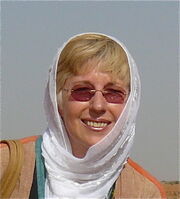
Patricia McArdle
Patricia McArdle, a member of Solar Cookers International's Global Advisory Council, is an advocate of sustainable, renewable energy, and an international promoter of integrated solar thermal cooking technology. Her award-winning novel Farishta, inspired by the year she spent in northern Afghanistan was published by Penguin/Riverhead Books on June 2, 2011. Farishta won the Amazon Breakthrough Novel Award Grand Prize for General Fiction and the San Diego Book Award.
McArdle served as the editor of the Solar Cooker Review, a board member with Solar Cookers International and Solar Household Energy. She continues to promote solar cooking on a volunteer basis by demonstrating, writing and speaking publicly about the benefits of this technology. In her lectures and demonstrations she explains that the widespread use of this simple technology will dramatically improve the lives of the hundreds of millions of women and children who travel miles from their villages to gather wood every week. Using solar cookers in combination with fuel efficient stoves and retained heat cookers (integrated cooking) will also dramatically reduce deforestation and CO2 emissions. Cooking and pasteurizing water with the sun can prevent millions of deaths each year from diseases caused by drinking contaminated water and by inhaling the smoke of cooking fires. McArdle has more than thirty years of international and public affairs experience.
Background
McArdle served as a Peace Corps volunteer health educator in Paraguay '72-'74. She joined the U.S. Navy in 1974 and attended Officers Candidate School in Newport, RI. She then spent three years as one of only two female military officers at a remote Naval communications base in Morocco. McArdle is a graduate of the University of New Mexico and has an MBA from Thunderbird School of International Management. After 27 years as a U.S. diplomat, she left government service in 2006. Her last overseas assignment was as the Department of State's senior representative with a British Army Provincial Reconstruction Team in Northern Afghanistan. It is there that she began her involvement with solar cookers.
Here in her own words is the story of her "solar cooker epiphany".
"I had heard of solar cookers before I went to Afghanistan, but I knew little about them or their incredible potential to save forests, reduce household air pollution and improve the lives of millions of women.
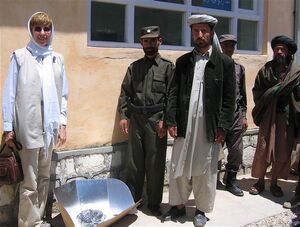
Patricia McArdle demonstrating her homemade Cookit to the governor, chief of police and villagers of Marmol in Balkh Province, Northern Afghanistan in March 2005
My solar cooker epiphany occurred on a cold but sunny March day while on patrol in the Hindu Kush with a NATO military observation team. During my travels around northern Afghanistan, I noticed that there were almost no trees and little ground-cover. Locals said the trees had been cut down for firewood or to make charcoal. As we drove one morning up a narrow trail to a remote village in the foothills of the Hindu Kush, we passed a group of young (five to seven year old) children leading donkeys down the trail.
After our meeting with the local leader, the soldiers and I were given a tour of the village. He showed us the one remaining “forest” in the area, a small grove of cedar and pine growing just above the village. It was guarded night and day to prevent the trees from being cut down for firewood. He explained to us that if his village lost their “forest,” the next big rain would wash them away. I was also invited into one of the family compounds and introduced to a women who was cooking lunch over a smoky fire fueled with what looked like tumbleweed stacked in a huge pile next to the mud-walled hut.
At the end of the day, we drove down the mountain, and again passed the children, who were on their way home. They were struggling to carry enormous bundles of the same brush I had seen the woman cooking with. As we headed west into the glare of the setting sun, I suddenly remembered a solar cooker I had made out of a cardboard box when I was a Girl Scout many years ago. “Someone should tell these people about solar cookers,” I thought.
That night, back at our fortified camp in Mazar-e Sharif, I trolled the Internet for information on solar cookers and found the Solar Cooking Archive, managed by Solar Cookers International. I spent the next few evenings learning about this remarkably simple technology. Eventually I downloaded several plans, and asked the British Army field kitchen staff for some old cardboard boxes, aluminum foil and flour to make paste. With the help of the soldiers, I constructed five different box- and panel-type solar cookers. I took them up to the roof of our compound and, over a period of several weeks, tested them and measured the results. The solar CooKit won the competition.
It was clear to me that there was a great potential in Afghanistan for the widespread distribution of solar cookers to:
- Reduce the amount of time children spend foraging for fuel
- Reduce erosion caused by a lack of ground cover (and the resulting flooding)
- Cut down on the amount of smoke that women are exposed to while cooking
I hoped to return eventually to the village that had inspired me to learn about solar cookers, demonstrate the CooKit, and see how the people would react to this remarkable technology. Several months later, we went back.
It was another cool, sunny day. A small group of men standing in front of the governor’s compound stared in silence as we arrived for our meeting. (Women are not allowed out in public unless the gathering is all female). Before going in to see the governor, I poured a bottle of water into a black pot, put the pot inside a transparent oven (turkey) bag, placed the bag in my homemade CooKit, turned the CooKit to face the sun and went inside with the soldiers.
When we came out of the meeting 90 minutes later, the pot was steaming and the crowd had swelled from 10 to about 40 men. They were scratching their beards, pointing at the CooKit and trying to figure out how this piece of cardboard covered with shiny paper was able to boil water. Where was the fire? It looked to them like magic even after I explained how it worked. The pot was clearly very hot, but the cardboard and aluminum foil were not. How could this be? They all insisted on coming up to touch the very hot pot and then the cool foil-covered cardboard to confirm what they were seeing.
One of the men exclaimed, “We could make our tea with this!” The others nodded enthusiastically. Another said he would be able to find cardboard, but “where,” he asked, “do I get that shiny paper?” They all looked at me in silence, waiting for an answer. I wasn’t certain how to reply, because I knew that aluminum foil was not sold anywhere but Kabul, which was more than 100 miles to the south over the Hindu Kush.
Another man smiled, reached into his back pocket and took out a pack of cigarettes. He pulled up the inner foil liner and shouted, “We could use this!” The other men nodded, and several more pulled out their own cigarette packs to examine the foil liners. A remarkable and almost instantaneous technology transfer had just taken place. Within five minutes, these men had figured out a use for solar cookers and they had discovered a way to manufacture them using a locally available resource. None of them suggested that their wives might be able to cook meals with this technology, but I was still very impressed with their positive and creative reaction to my very brief demonstration. If they only used the CooKit for heating tea water, they would still dramatically reduce biomass consumption in their village.
I began inquiring about solar cooker projects in Afghanistan and found that Kabul residents Gordon Magney and his wife, who had taught Afghan women to use several thousand SPORT solar box cookers, were two of the very few people in Afghanistan involved in the promotion of solar cookers. (I learned later that Sun Ovens International had, several years earlier, also distributed solar cookers in Afghanistan.) Magney gave me a detailed proposal for another solar cooker project. I tried to generate support for his project within our embassy and U.S. Agency for International Development (USAID) mission, but, sadly, was not successful. There have been a few other dedicated individuals including Grace Magney who have promoted solar cooking in Afghanistan. Grace assisted me with a report I prepared in 2008 titled Promoting Solar Cooking in Afghanistan. I also created a YouTube video on solar cooking in Afghanistan. Please see Afghanistan for additional information on solar cooking projects in that country. Another is Sabur Achtari founder of the Afghan Bedmoschk Solar Center.
I have told this story and given solar cooker presentations many times at the U.S. State Department, the Peace Corps, USAID and elsewhere since my return from Afghanistan. In 2007, colleagues from DC-based Solar Household Energy and I set up a demonstration with several types of solar cookers and prepared typical refugee dishes of dried beans and peas in the courtyard of the State Department's Bureau of Population, Refugees and Migration in 2008. PRM's assistant secretary Ellen Saubry ate a plate of our solar cooked food and stated in an AP video report that this was an important technology which should be used. We're still waiting for some support from the State Department and USAID.
The Partnership for Clean Indoor Air, a now closed branch of the U.S. government's Environmental Protection Agency, funded solar cooker projects in Mexico, Bolivia and Kenya. In 2009 I helped coordinate an issue of an EPA PCIA on-line bulletin that focused exclusively on solar cooking.
For several years, the Defense Department showed some interest in solar cooking, The The STAR-TIDES group at the National Defense University invited solar cooking reps to participate in their first week long outdoor TIDES expo in 2007. I organized the solar cooking demos during TIDES for the next six years. Until 2016, TIDES demos took place at the National Defense University and the Pentagon. Their annual expo is now held at George Mason University in Virginia.
DOD's SouthCom sent me twice to Honduras and once to Guyana to demonstrate solar cooking to military personnel, civil defense officials and university students, as part of annual disaster preparedness simulations.
U.S. military officers serving at Provintial Reconstruction Teams in Afghanistan have worked with local Afghan craftsmen to build and promote the use of solar cookers. As a former Naval Officer and the daughter of a career Marine officer, I am grateful for and very supportive of the interest shown by the U.S. military in this technology. I only wish I could convince my civilian government colleagues to show the same degree of enthusiasm for this zero emission, renewable energy technology. Every Peace Corps volunteer going to an energy-starved, sun drenched country should receive training in solar cooker technology. In 2021, I was asked to write the solar cooking section for the Peace Corps Improved Cookstove Handbook. In I remain hopeful that future administrations will give greater support to the spread of this simple, green, technology that uses earth's most abundant source of energy." --Pat McArdle
News
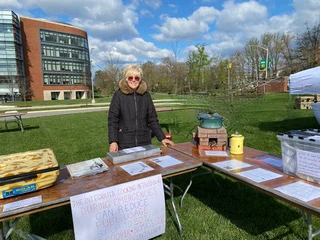
Pat McArdle presents solar/integrated cooking information at STAR-TIDES 2022. Photo credit: Pat McArdle
- April 2022: Pat McArdle hosted an exhibit on solar/integrated cooking at the STAR-TIDES expo on the grounds of George Mason University in northern Virginia, USA in mid-April. The purpose of this civ/mil entity is to identify low-cost, sustainable solutions for supporting distressed populations damaged by disasters, war, or poverty and to share this knowledge openly with anyone, including military, government, non-government, and civilian agencies. She built a sixteen brick rocket stove and made a retained heat container using a plastic storage bin and some blankets. In spite of the windy weather, solar and other integrated cooking concepts were successfully presented. From 2013 to 2020 the U.S. Army sent Pat three times to Central America to teach solar cooking during military disaster exercises. She used the Cookit for all of those exercises since it was the lightest and most portable solar cooker at that time.
- May 2021: Unique solar cooking techniques - Patricia McArdle organized the first Zoom discussion for members of the Solar Cookers world Network. Presenters discussed unique ways to solar cook. Some focused on foods, some on techniques and others on technology. Here's the link to today's discussion: Unique solar cooking techniques
- February 2020: Pat McArdle was interviewed at the third CONSOLFOOD by Michael Bonke on his podcast, SunPod
- March 21, 2020 Solar cooking demo at Los Angeles Institute of Contemporary Art cancelled due to pandemic
- January 20, 2020 Moderator ColSol Food conference panel, Faro, Portugal
- January 18, 2019 Interview with Peace Corps Worldwide
- May 3, 2017 Lecture at Valley Center, California on solar cooking technology
- April 28, 2017 Solar Cooker Demo at Cal State Fullerton
- July 17, 2012 Interview with Kera 'news for north Texas
- May 12, 2017 https://www.solarcooker-at-cantinawest.com/why-are-some-organizations-against-solar-cooking-as-a-feasible-means-of-cooking.html
- March 2017 lecture on solar cookers in refugee camps at SCI conference in India
- August 2016: Patricia McArdle has drafted a detailed report covering the history and present state of refugee camp solar cooking programs. Read the report...
- June 17, 2016 Solar cooker demo and lecture at LIFE Mira Costa College, Oceanside, Ca.
- May 2016 Foreign Service Journal "Pat McArdle-What Retired Diplomats are Doing Now"
- March 18, 2016 Patricia McArdle speaks about solar cooking at San Diego Women's week.
- April 21, 2015 GoSol interview
- 2017 Interview with UNM alumnus Patricia McArdle
- January 2015: GACC has released their November 2104 Post-Summit Report
- January 2015: Patricia McArdle's responds to the GACC Post-Summit Report from the November 2014 conference.
- September 26, 2014 Lecture on the factors that give donors confidence to fund solar cooking
- August 2014: Solar cooking demo with Sunset Magazine cooks, which included solar cooker recipes in their book Great Outdoors Cookbook, which included solar cooker recipes.
- July 2014 Speaker at Girl Scout San Diego Award Ceremony
- June 11, 2014 Patricia McArdle receives Girl Scout 'Cool' Award, Coast News
- March 24, 2015 Shepherd University Book expo
- March 2014: Pat McArdle was interviewed for the feature story in this month's edition of the TIDES (Transformative Innovation for Development & Emergency Support) newsletter. She describes her role, and that of Solar Cookers International, to introduce solar cooking to, as Pat puts it, "people in sun-rich countries in the developing world who were running out of wood to burn." Solar cooking was unknown in this part of the world at the time. Many of the early projects were started in the late eighties. She also explains how solar cooking is a key component of the practical integrated cooking method. Read the interview...
- March 18, 2013 World Bank: Mobilizing a $100 billion market to bring clean cooking to the poor (see comments section)
- June 8, 2013 Malawi and solar cooking
- November 2012: Former SCI board member Pat McArdle is interviewed on Emerald Planet - During the interview Pat McArdle discusses the history and mission of Solar Cookers International, the importance of increasing access to solar cooking technology, Bob Metcalf's Portable Microbiology Laboratory for testing water in remote locations, the work of Jewish World Watch in Chad, and more.]
- September 28, 2012 Solar cooker exhibit at DOD TIDES expo (6th year of participation)
- Fall 2012 Patricia McArdle becomes editor of the solar cooker review for it's final seven issues 11/2012-9/2014
- August 6, 2012 A more durable solar cooker
- May 2012: Pat McArdle describes the current top ten solar cooking projects - Read the document.
- June 21, 2012 A more durable solar cooker for refugee camps USAID
- January 2012: Workshop on the construction of Scheffler Community Kitchens in Dhule, India: Read report.
- June 9, 2011 Girl Scout profile on solar cooker promoter
- October 2011: Patricia McArdle, of Solar Cookers International, demonstrated solar cooking with Afzal Syed and volunteers, Sherry and Cecily, at the TIDES exhibit on the campus of the National Dense University. Afzal brought several pots of raw ingredients for Pakistani dishes that were prepared by his wife Samina, including: masoor dall, spiced potatoes, okra, and chawal rice. Patricia baked a loaf of banana bread, which was consumed in less than five minutes. They used the parabolic SK10 (similar to the SK12), purchased from Deepak Gadhia several years ago, to keep a pot of water boiling from 9 a.m. in the morning until the event ended at 5 p.m. There were a number of senior military visitors from other countries. Several have expressed an interest in learning more about solar cooking technology and how it can be used in their countries. The most surprising visit yesterday was from a Vietnamese general, the most senior Vietnamese military officer to visit the U.S. since before the war with Vietnam started in the sixties. Several 'very important people' who came to the demonstration assumed that it would take us 10 to 12 hours to cook food in a panel or box cooker. They were astounded that the food was cooked in less than three hours--in October-- in Washington, D.C.--which is 40 degrees north of the equator.
 Patricia McArdle and volunteer Cecily, remove Pakistani okra from a CooKit panel cooker at TIDES 2011. |
 Afzal Syed opens a pot of Pakistani dall at TIDES 2011 |
 Everything was cooked by one p.m. and gone by 2 p.m. at TIDES 2011 |
 People continue to be amazed--especially that it takes only twenty minutes to boil a pot of water at TIDES 2011. |
- August 2011: The Spendid Table radio show interviews SCI Board Member Patricia McArdle - Listen to Patricia discussing solar cooking in Afghanistan.
- July 19, 2011 Solar ovens offer hope News 24 interview
- July 19, 2011 Arab News solar ovens
- July 18, 2011 Solar ovens, renewable energy offer hope for Afghanistan (Reuters) - At first, she noticed Afghan children hauling brush. Then, in Afghan family compounds, she noticed women tending small fires and trying to cook over them. But it wasn't until U.S. diplomat [and Solar Cookers International Board Member] Patricia McArdle realized how often it was sunny in Afghanistan that she put it together with a youthful memory of cooking with solar ovens and realized this was a low-tech option offering long-term hope to the war-torn nation, which is preparing for a draw-down of U.S. troops. At first, she noticed Afghan children hauling brush. Then, in Afghan family compounds, she noticed women tending small fires and trying to cook over them. But it wasn't until U.S. diplomat [and SCI Board Member] Patricia McArdle realized how often it was sunny in Afghanistan that she put it together with a youthful memory of cooking with solar ovens and realized this was a low-tech option offering long-term hope to the war-torn nation, which is preparing for a draw-down of U.S. troops. Read more...
- July 8, 2011 Solar Cooking Expo at Dar al Nur Mosque in northern Virginia. view interview at the mosque
- July 6, 2011 Kojo Naamdi show interview with Patricia McArdle
- June 20, 2011 New York Times op-ed "Afghanistan's Last Locavores"
- June 2011: Voice of America interviews Patricia McArdle about her novel Farishta - Solar Cookers International board-member Patricia McArdle discusses her award-winning novel in which solar cooking in Afghanistan is featured. Audio available here.
- May 2011 interview with Farishta author
- January 2011: Pat McArdle joins the Global Alliance for Clean Cookstoves working group on Fuels and Technology, to represent the global solar cooking community.
- October 2010: The Voice of America interviews McArdle about Solar Cookers International's participation for the third year at the annual TIDES disaster relief technology gathering at the National Defense University in Washington D.C. TIDES' goal is to facilitate the sharing of information with quicker response times when natural disasters occur.
Disaster Relief Technology
Pat McArdle interviewed about disaster relief technology.
- June 2010: McArdle's novel Farishta which has solar cooking in Afghanistan as a subplot won Amazon's Breakthrough Novel Award. It will be published on June 2, 2011.
- May 2010: Utah-based Adopt-a-Native Elder asked McArdle to join one of their food runs to the Navajo reservation to make a series of presentations on solar cooking. She discovered that in the winter when roads are closed by deep snow and propane runs out, many Navajos cut down trees for firewood. In the summer when it's too hot to cook indoors, it is common to light a wood fire outside for cooking. Sunshine is abundant and despite "no cutting down trees" warnings in the national parks, she saw hillsides that had been stripped of their trees and thousands of acres formerly covered with juniper and pinyon trees that are now barren desert. The Navajos who saw the solar cookers and ate her chili and corn bread were intrigued by these devices. Twenty volunteers took the different models home and agreed to keep a one month log of solar cooker use. A family of sheepherds took several Cookits, which are light enough to strap to their saddles for long trips into the mountains. Adopt-a-Native-Elder has already heard from one satisfied customer, a Navajo rug weaver, who slaughtered a sheep for a family event and roasted a chunk of the meat in his Sun Oven. McArdle met a group of Navajo students at White Horse High School in Montazuma Creek, Utah, who have constructed a fresnel lens solar cooker for making fry bread. They were finalists in the national Spirit of Innovation Award. Their science teacher Paul McCarl is hoping to manufacture more of these cookers that his students can demonstrate at local gatherings during the summer.
- April 2010: For the second year in a row, Google has invited solar cooker promoters to host an Earth Day demo and display at Google headquarters in Mountain View, California.
- Oct. 7, 2009 DOD expo at War College features solar cookers
- October/November 2009: McArdle was invited by Tchad Solaire to join an international team that assessed the Tchad Solaire cooker project at a Darfur Refugee Camp in Touloum, Eastern Chad. During their three week trip they interviewed several hundred refugee women in their homes. Their findings and recommendations are included in a report for which McArdle was the principal drafter. It has been shared with UNHCR, USAID and the Department of State.
- October 2009: McArdle hosts another week-long outdoor working demonstration of solar and retained heat cooking devices at the TIDES exhibit, National Defense University, Washington, D.C.
- July 15, 2009 Georgetown, Guyana paper features solar cooking demo by Patricia McArdle
- April 2009: Mark Aubin, the co-founder of Google Earth invites McArdle to organize a working solar cooker display at Google headquarters in Mountain View for Earth Day.
- April 2009 Comments on the defects of award winning Kyoto Solar box cooker
- February 2009 Audio interview with Patricia McArdle
- December 2008: McArdle traveled to New Delhi to make a presentation at the Women's Refugee Committion Fuel and Firewood Conference on the integrated solar cooking project at three Darfur Refugee Camps in Eastern Chad sponsored by Jewish World Watch. From there she traveled to Langtang National Park in Nepal to work with local World Wildlife Fund personal and conduct training sessions on the use of the solar Hot Pot in several remote villages. Thanks to funding from TIDES she was also able to attend the Solar Food Processing Conference in Indore, India in January 2009.
- August 2008: McArdle showed the 24 members of Boy Scout troop 684 in Mt. Vernon, Va, how to make a Larry Winiarski-designed sixteen brick rocket stove, how to make a Cookit from a cardboard box and and how to make a hay basket using a black plastic garbage bag and crumpled newspaper. They baked cakes and roasted chicken and vegetables. They pasteurized water in the Cookit using the WAPI. The boys were enthusiastic learners and their Marine Corps dads were astounded at the simplicity of these powerful technologies. The boys will be demonstrating their new integrated cooking skills at the upcoming national scout jamboree.
- August 2008: McArdle hosted the third of four all-day solar cooker demonstrations at the U.S. Botanic Gardens with Dave Chalker (who distributes the Tulsi Hybrid in the U.S.) They were given a primo location right in front of the entrance. Several thousand people walked by their exhibit (Chalker cooked chicken and McArdle baked six cakes). They were able to talk to several hundred people from countries all over the world.
- October 2007: McArdle hosted a two-week working demonstration that featured a variety of solar cookers, fuel-efficient stoves and heat-retention devices during the Transportable Infrastructures for Development and Emergency Support (TIDES) exhibit at the National Defense University (NDU) in Washington, D.C. Several hundred military and civilian officials from area agencies visited the exhibit, which was held at Fort McNair. McArdle demonstrated the three types of solar cookers: panel, box, and concentrator. The exhibit included posters on solar cooker technology and displays of Dr. Bob Metcalf’s Portable Microbiology Laboratory and SCI’s Water Pasteurization Indicator (WAPI). She tested Anacostia River water and used an AquaPak™ to solar pasteurize the contaminated water. As often occurs at solar cooker exhibits, visitors had to burn their fingers on the steaming pots before they could believe what they were seeing! The weather was excellent, and food was solar cooked and served to visitors every day. On two partly cloudy days, fuel-efficient wood stoves and retained-heat devices were used to finish the cooking of chicken stew, rice, and beans begun in the solar cookers. The TIDES exhibit was repeated for two days in early November at the Pentagon. Cloudy weather unfortunately made it impossible to solar cook. At both exhibits, McArdle explained to visitors the principles of integrated solar cooking: use solar cookers whenever the sun is out, save precious fuel for nights and cloudy days when fuel-efficient stoves are the appropriate technology, and in either case use heat-retention devices to maintain cooking temperatures in pots that have been removed from their heat source. Under the overcast skies at the Pentagon, she was able to cook chicken tajine, lentil stew, and couscous with a fuel-efficient stove, a heat-retention device, and a few small twigs gathered on site. The TIDES exhibit is an effort by Dr. Lin Wells of the NDU to bring together a volunteer cadre of “experts” that can pool their knowledge of easily deployable energy efficient technologies that could be used in disaster and humanitarian situations.
- September 12, 2007 Interview with USAID on solar cooking
Articles in the media
- January 2019: RPCV Patricia McArdle: PCV, Diplomat, Novelist, Solar Cook - Peace Corps Worldwide
- May 2017: Solar Cookers: Who Needs Them? - Valley Center Happenings
- May 2017: U.S. Diplomat to Speak on Solar Cooking at DVGC May 9 Meeting - Valley Center Happenings
- January 2017: The Use of Solar Cookers in Refugee Camps - Patricia McArdle
- July 2011: Solar ovens, renewable energy offer hope for Afghanistan - Reuters
- June 2011: Farishta: A Compelling Novel About War & Rebuilding, Love & Loss - Huffington Post
- September 2007: Security Through Solar - Washington Post (letter to the editor)
Audio and video
- March:2023
Volunteerism- How Can the Foreign Service Best Contribute?-2
Former U.S. diplomat, Patricia McArdle, was invited to participate in a panel discussion by the American Foreign Service Association to speak to several hundred retiring diplomats during a panel discussion about volunteer opportunities. She called out Solar Cookers International and Solar Household Energy as possible organizations to explore
Videos produced by Patricia McArdle
- May 2021:
- June 2015:
Pat McArdle - Integrated Cooking Method-2
Pat McArdle of Solar Cookers International discusses the Integrated Cooking Method which is the combined use of three cooking devices to dramatically reduce emissions and fuel consumption. Only one of these devices used burns any fuel.
- July 2014:
Yes We Do Solar Cook
Participants from around the world at the Solar Cooking Festival, Sacramento, California, USA, July 2014
- June 2012:
- July 2010:
- February 2010:
- August 2009:
- January 2009:
- September 2008:
Other audio and video
- January 2017:
- June 2015:
- July 2014:
- March 2012:
Gasifier stove and other renewable fuel technologies.m4v
Professor Ajay Chandak demonstrates some of his renewable and sustainable designs for a gasifier stove, institutional solar parabolic cookers and biodigesters.
- Summer 2011:
Tides 2011a.mov
Patricia McArdle is interviewed about solar cooking at the 2011 TIDES demonstration of alternative energy in Washington D.C. The annual event brings together government and private-sector organizations to share professional knowledge and field experience.
Audio interviews
- February 2020: Pat McArdle was interviewed at the third CONSOLFOOD by Michael Bonke on his podcast, SunPod
- August 20, 2011: Pat was interviewed on NPR's The Splendid Table
- July 6, 2011 Patricia McArdle was interviewed on the Kojo Nnambi Show by Rebecca Roberts to discuss her first book, Farishta, and her work bringing solar ovens to the rural poor in Afghanistan. Listen to the interview.
External links
- March 2008: Louise Meyer and Patricia McArdle explain how the Solar Cookers work - YouTube
See Also
Contact
Patricia McArdle can be contacted through an email form here: http://www.patriciamcardle.com

